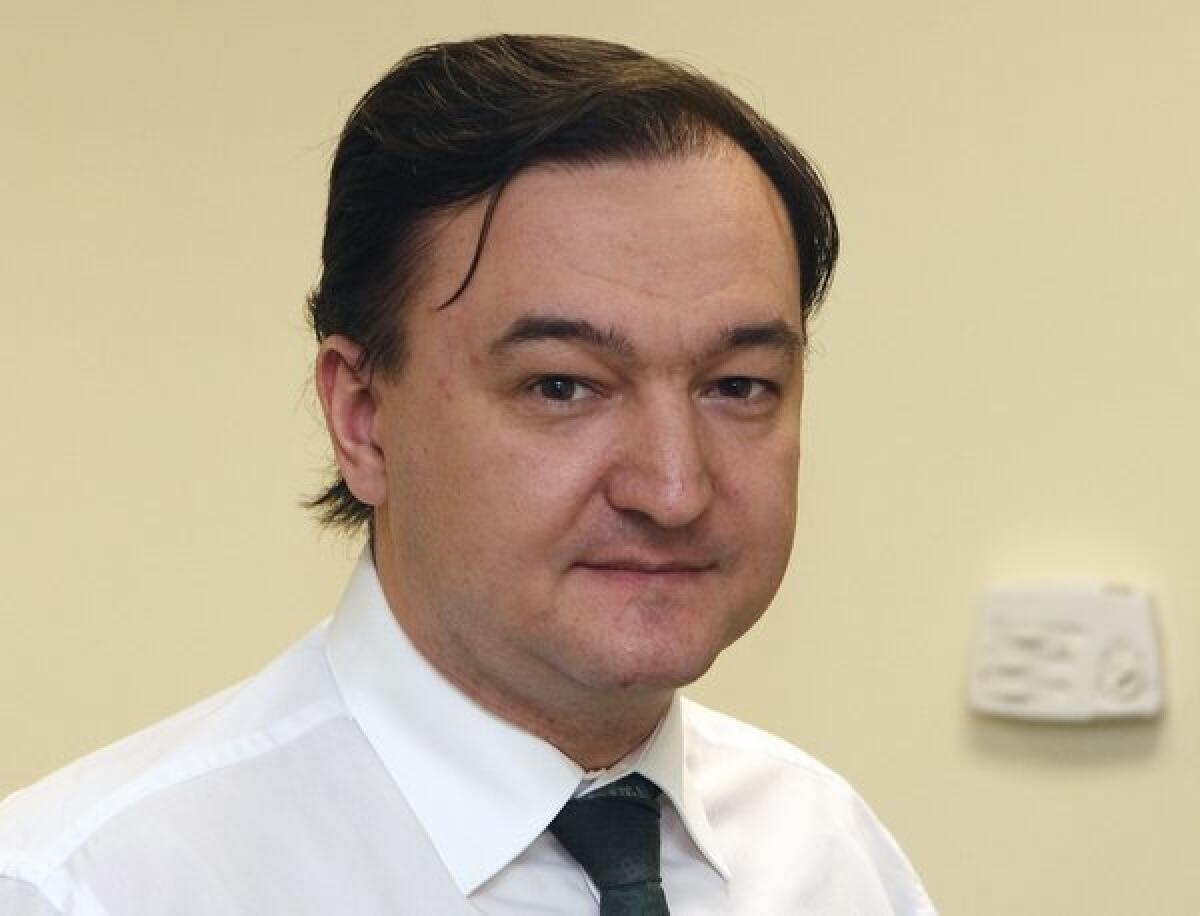Russian court convicts dead lawyer Magnitsky; case led to adoption ban

MOSCOW -- A judge on Thursday found Sergei Magnitsky, a Russian whistleblower who died in custody in 2009, guilty of tax evasion, bringing an end to an unusual, posthumous trial that drew international condemnation and eroded U.S.-Russian relations.
The ruling against Magnitsky, a lawyer who disclosed an alleged multimillion-dollar scam, was largely symbolic. Judge Igor Alisov of Moscowâs Tverskoy district declared the case closed and there was no judgment against Magnitskyâs estate.
However, Magnitskyâs former boss, William Browder, CEO and co-founder of the investment fund Hermitage Capital Management, was also found guilty of tax evasion and sentenced to nine years in a Russian prison camp. He had been tried in absentia as part of the same case and said he will stop traveling to Russia or allied countries where he might face arrest.
In a telephone interview from New York, Browder called the court ruling âone of the most shameful moments for Russia since the days of Josef Stalin.â
Some human rights activists, including those close to the Kremlin, called the ruling against Magnitsky and the trial itself absurd.
âIt is not the most appropriate of judicial decisions taken in Russia in recent times, putting it mildly,â said Mikhail Fedotov, the chairman of the Presidential Council on Civic Society and Human Rights, a Kremlin advisory body. âBesides, the dead canât be tried by any human court; it is up to history to try them.â
Fedotov, speaking in an interview, added that the ruling will damage the image of Russia abroad.
The Magnitsky case already has contributed to a chill in relations between Russia and the United States. In December 2012, Congress passed the Sergei Magnitsky Rule of Law Act, which imposed visa restrictions and financial sanctions against a group of Russian officials, policemen and tax inspectors involved in the prosecution and death of the lawyer.
The Kremlin immediately responded by imposing visa restrictions on various U.S. officials and by compelling parliament to adopt a highly controversial bill banning adoptions of Russian children by U.S. families. The law halted more than 300 adoption cases that were nearing completion, drawing anguished criticism from American and Russian adoption officials and families.
The case began in 2008, when Magnitsky publicly alleged that a group of law enforcement, security and tax officials had taken part in a complex tax conspiracy. As part of the scheme, he alleged, Hermitage Capital Management was improperly accused of tax evasion. Then, he said, the officials allegedly used Hermitage documents obtained during their investigation to funnel $230 million in tax refunds to associates at affiliated companies. The money was then allegedly channeled to overseas accounts.
In response to the allegations, authorities arrested Magnitsky for tax evasion.
His death in prison, in November 2009, was officially determined to have been caused by a heart attack. Officials said he had been given appropriate medical care.
However, in July 2011, the presidential council led by Fedotov presented to then-President Dmitry Medvedev its findings that Magnitskyâs poor health had been ignored in custody and there was evidence that he was beaten in the last minutes of his life.
The report also said that the circumstances of the alleged $230 million tax refund scam were closely linked with the lawyerâs death and should be properly investigated.
Since then, the Russian Investigative Committee has found no foul play behind Magnitskyâs death. The only person charged in his death, a deputy chief of Butyrskaya Prison in Moscow, was acquitted of any negligent treatment.
Fedotov complained that his council could have helped uncover the truth but âthe case was strongly politicized, primarily by the U.S. Congress.â
Russian lawmaker Andrei Lugovoy--who is himself a suspect in a notorious criminal case--expressed satisfaction with the ruling, and said it should put a stop to speculation about Magnitskyâs death.
âThe death of Magnitsky was a human tragedy, but personally I never doubted that Magnitsky and Browder were criminals,â Lugovoy said in an interview. âI am deeply satisfied with the court ruling in a case that was turned into a political battle largely by U.S. politicians.â
The London-based Browder, convicted in absentia, said Russian President Vladimir Putin âhas been desperate to discredit Sergei Magnitsky and discredit me because of the Magnitsky Act, which put at risk billions of dollars of ill-gotten gains of corrupt Russian officials in the West.â
He added: âThey already killed Sergei, so there will be no repercussions for him, but as for myself as long as I donât travel to countries that are allies with Russia, it is very unlikely that Iâll ever be arrested on a Russian arrest warrant.â
ALSO:
In Syria, no letup in fighting as Ramadan begins
Israel holding Palestinian who disappeared in Egypt
Global Voices: VW van bio tracks groovy rides to the far reaches
More to Read
Sign up for Essential California
The most important California stories and recommendations in your inbox every morning.
You may occasionally receive promotional content from the Los Angeles Times.










